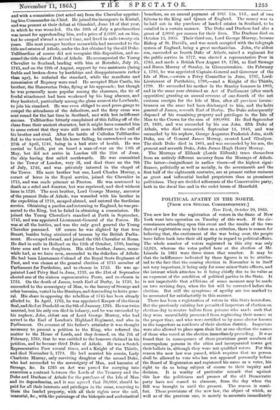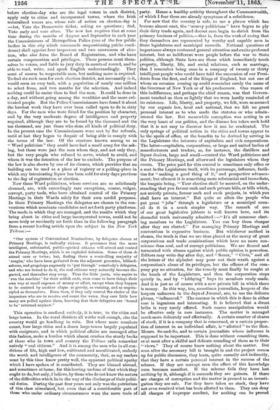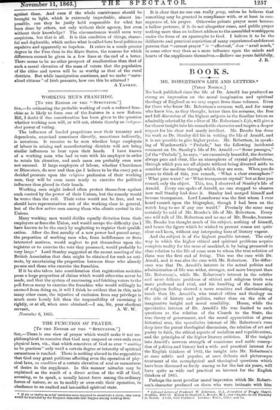POLITICAL APATHY IN THE NORTH.
[FROM OUR SPECIAL CORRESPONDENT.]
New York, October 20, 1865. THE new law for the registration of voters in the State of New York went into operation on Tuesday of this week. If the cir- cumstances attending upon this event and the results of the two days of registration may be taken as a criterion, there is reason for believing that, the excitement of the war being over, the people have fallen back into their old apathy in regard to political affairs. The whole number of voters registered in this city was only 52,024, whereas the votes polled here at the election of Mr. Lincoln in 1864 were three times that number. It may be that the indifference indicated by these figures is to be attribu- ted to the fact that the coming election in November is in itself not very important, it being only for some minor State officers, and the interest which attaches to it being chiefly due to its value as an exponent of the condition of political parties in the State. It is not improbable that additions of some moment may be made on two revising days, when the list will be corrected before the election. But still the symptoms of apathy are too marked to be accounted for satisfactorily in this manner.
There has been a registration of voters in this State heretofore. But the previously existing law permitted inspectors of election on election-day to receive ballots from persons who made oath that they were unavoidably prevented from registering their names at the proper time, and who were certified to by some elector known to the inspectors as residents of their election district. Inspectors were also allowed to place upon their list at one election the names of those who voted at the election immediately preceding. It was found that in consequence of these provisions great numbers of unscrupulous persons in the cities and incorporated towns got their ballots in, although they were not qualified voters. For thia reason the new law was passed, which requires that no peisou shall be allowed to vote who has not appeared personally before the Board of Registration and registered his name as a voter, his right to do so being subject of course to their inquiry and decision. It is worthy of particular remark- that against this law the politicians and presses of the oll Democratic party have not ceased to clamour, from the day when the Bill was brought in until the present. The reason is mani- fest. These provisions of the new law, the object of which, as well as of the previous One, is merely to ascertain immediately before election-day who are the legal voters in each district,• apply only to cities and incorporated towns, where the Irish naturalized voters are, whose rule of action on election-day is —1st, Vote the Democratic ticket, asking no questions ; 2nd, Vote early and vote often. The new law requires that at some time during the mouths of August and September in each year the Commissioners of Metropolitan Police (one of the few public bodies in this city which commands unquestioning public confi- dence) shall appoint four inspectors and two canvassers of elec- tion, who also form the Board of Registration, and who have certain compensation and privileges. These persons must them- selves be voters, and liable to jury duty in courts of record, and be able to read, write, and speak English understandingly. They must of course be respectable men, but nothing more is required. To find six such men for each election district, not necessarily in it, would seem an easy task, with a population of nearly one million to select from, and two months for the selection. And indeed nothing could be easier than to find the men. It could be done in a day, and without going among the wealthier and the more cul- tivated people. But the Police Commissioners have found it about the hardest work they have ever been called upon to do in sixty days. For the men who were fitted for the position by character, and by the very moderate degree of intelligence and property required, although they are to be found by the thousand and the ten thousand, are just those who shun all kinds of political duty. In the present case the Commissioners were met by flat refusals, until at last they began to despair of being able to comply with the terms of the law. Of the creature known among us as " Ward politician" they could have had a small army for the ask- ing, but those were just the men whom they, and not only they, but the very people who refused to serve, wished to avoid, and whom it was the intention of the law to exclude. The purpose of the law is also shown by one of its clauses, which provides that no building can be used as a place of registry or a polling-place in which any intoxicating liquor has been sold for sixty days previous to the day of registration or election.
Now these Ward politicians, whose services are so solicitously shunned, are, with exceedingly rare exceptions, coarse, vulgar, corrupt, party tools, who have obtained control of the Primary Meetings in their Wards solely for their own sordid purposes. In these Primary Meetings the delegates are chosen to the con- ventions which nominate candidates and set forth party platforms. The mode in which they are managed, and the results which they bring about in cities and large incorporated towns, could not be more truly or succinctly set forth than in the following paragraph from a recent leading article upon the subject in the New York Tribune "Our system of Conventional Nominations, by delegates chosen at Primary Meetings, is radically vicious. It presumes that the more intelligent, substantial, public-spirited citizens will attend and control the Primary Meetings, which is an exploded delusion. Some of them do attend once or twice; but, finding there a controlling majority of `roughs,' who have been gathered from the adjacent groceries, billiard- saloons, and grogshops expressly to 'put through' somebody's delegates, and who are bound to do it, the real citizens very naturally become dis- gusted, and thereafter stay away. Thus the little junta, who aspire to run the machine ' for their selfish ends, soon come to have things their own way at small expense.of nioney or effort, except when they happen to be resisted by another clique as greedy, as cunning, and as unprin- cipled as themselves. Even then, if they only control the choice of the inspectors who are to receive and count tho votes, they care little how many are polled against them, knowing that their delegates are bound to be' returned anyhow."
This operation is confined entirely, it is true, to the cities and large towns. In the rural districts all works well enough, else the country would go headlong to ruin. But where mere numbers count, four large cities and a dozen large towns largely populated with emigrants, and in which political affairs are managed after this fashion, make a burden which almost crushes the sturdy backs of those who in town and country the Tribune calls somewhat naively " real citizens." And it is among the men who in all con- ditions of life, high and low, cultivated and uncultivated, embody the worth and intelligence of the community, that, as my readers must by this time know pretty well, the apparent political apathy which I have spoken of is manifested. They are blamed abroad, and sometimes at home, for this leaving undone of that which they ought to do, but only, I believe, by those who do not know the nature of the difficulties which lie in the way of the discharge of their politi- cal duties. During the past four years not only was the patriotism of this class stimulated, but even that of a considerable part of those who under ordinary circumstances were the mere tools of
party. Hence a healthy activity throughout the Commonwealth, of which I fear these are already symptoms of a subsidence.
For now that the country is safe, to use a phrase which has become almost cant, the "scurvy politicians " have begun to ply their dirty trade again, and decent men begin to shrink from the primary business of politics,—that is, from the work of seeing that they themselves are represented by worthy and capable men in State legislatures and municipal councils. National questions of importance always conimand general attention and excite profound interest, but so indifferent were people before the war to State politics, although State laws are those which immediately touch property, liberty, life, and social relations, such as marriage, that I remember being once in a company of twenty or thirty intelligent people who could have told the succession of our Presi- dents from the first, and of the Kings of England, but not one of whom on occasion coming up could remember surely the name of the Governor of New York or of his predecessor. One reason of this indifference, and perhaps the chief reason, was that Govern- ment touched us then so lightly that we were hardly reminded of its existence. Life, liberty, and property, we felt, were so secured by our organic law, local and national, that we felt no great personal interest as to who made the statutes or who admin- istered the law. But meanwhile corruption was setting in at the very heart of our politics, and the disease has taken such hold that it is not easy to discover how it can be eradicated. The only springs of political action in the cities and towns appear to be the spoils of office, or the benefits to be derived by serving in the Legislature the interests of capitalists and rich corporations. The latter—capitalists, corporations, or large and united bodies of manufacturers and traders, as, for instance, the distillers and liquor dealers, large and small—control the Ward politicians and the Primary Meetings, and afterward the legislators whom they create. The price paid for this control is sometimes only office or a seat in the Legislature itself, with its patronage, influence, facili- ties for " making a good thing of it," and prospective advance- ment; but of tenest it is something more substantial and immediate, the bargain being, " Your election shall be secured, on the under- standing that you favour such and such private bills, or bills which, not strictly private, favour such and such projects, in which you shall have an interest." But quite as often the people who put great " jobs" through a legislature or a municipal coun- cil do it in a much simpler way. The remark of one of our great legislative jobbers is well known here, and its shameful truth universally admitted :—" It's all nonsense elect- ing members to the Legislature. You can buy them cheaper after they are elected." For managing Primary Meetings and conventions is expensive business. But whichever method is chosen, the truth is that we are thus placed at the mercy of great corporations and trade combinations which have no more con- science than soul, and of corrupt politicians. We are fleeced and tormented with abuses against which public opinion is powerless. Editors may write day after day, and Senex," " Civis," and all the letters of the alphabet may pour out their wrath against a corporation's abuse of its privileges, but the officers of the com- pany pay no attention, for the remedy must finally be sought at the hands of the Legislature, and then the corporation steps quietly in, and by " lobbying" buys its members ready made. And it is just so of course with a new private bill in which there is money. In this way, too, sometimes journalists, keepers of the keepers unknown in the days of Juvenal, are, to use the delicate phrase, "influenced." The manner in which this is done in either case is ingenious and interesting. It is believed that a direct bribe is very rarely offered. Such coarse manipulation would • be effective only in rare instances. The matter is managed much more delicately and effectually. A certain number of shares of stock, if it is a company that is concerned, or a certain propor- tion of interest in an individual affair, is " allotted " to the Hon. Messrs. So-and-So, and to certain journalists whose influence is supposed to be important. This is done without consulting them, or at most after a skilful and delicate sounding of them as to their "views." They of course know nothing about the matter. But soon after the necessary bill is brought in and the project comes up for public discussion, they learn,- quite casually and indirectly, that they have a certain personal interest in the success of the scheme. If they are corrupt men the effect of this knowledge soon becomes manifest. If the scheme fails they have lost nothing by it, although if it succeeds they are gainers. If there are charges of corruption and the matter is pressed to an investi- gation they are safe. For they have taken no stock, they have not even received what has been allotted to them. They can deny all charges of improper conduct, for nothing can be proved
against them. And even if the whole contrivance should be brought to light, which is extremely improbable, almost im- possible, can they be justly held responsible for what has been done by others, not only without their agency, but even without their knowledge? The circumstances would seem very suspicious, but that is all. It is this condition of things, shame- ful and deplorable, which makes what is called here local politics so repulsive and apparently so hopeless. It exists in a much greater degree in the Free than in the Slave States, the reasons for which difference cannot be given in a few lines at the end of a letter. There seems to be no other prospect of amelioration than that of such a moral elevation of the mass of voters that the population of the cities and towns will be as worthy as that of the rural districts. But while immigration continues, and we make " natu- alized citizens " of Irish peasants, how can this be attained ?
A YANKEE.
































 Previous page
Previous page